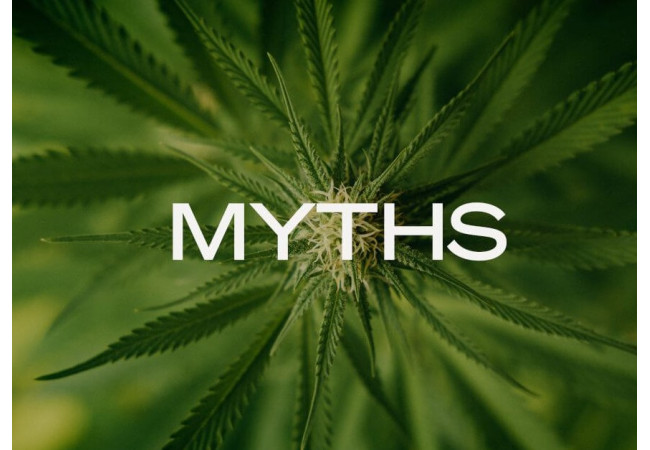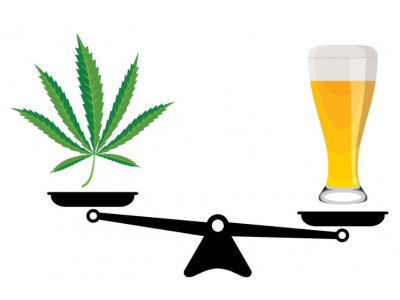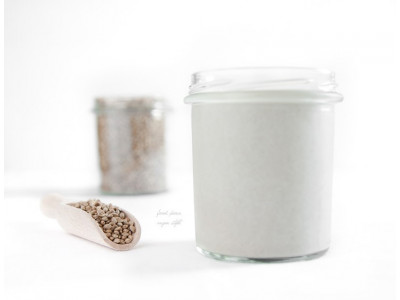
Marijuana is a plant that has been overgrown with legends, rumors, and, of course, myths. Some people consider it a panacea, others a path to the abyss, but where is the truth? Myths about cannabis often overshadow the real facts, creating misconceptions. In this article, we'll debunk seven of the most common myths about marijuana, add a little humor, and arm you with the facts about cannabis so you can separate the wheat from the chaff.
This article was created for informational purposes and does not advocate the use of marijuana or violation of the law. In many countries, including Ukraine, the use of marijuana other than for medical purposes is illegal. Always follow local laws and consult your doctor before using cannabis for medical purposes.
The information in this article is based on publicly available scientific data, but individual responses to marijuana may vary. If you are considering using cannabis, consider the potential risks and seek professional advice. Our goal is to debunk myths, not to advocate any action.

Myth 1. Marijuana is highly addictive
One of the most common myths about marijuana is that it is instantly addictive, like hard drugs. In fact, the risk of developing a dependence on marijuana is much lower than on alcohol or nicotine. Studies show that only about 9% of users can develop psychological dependence, and this is usually associated with regular and long-term use.
It is important to understand that marijuana addiction is more psychological than physical. A person can get used to relaxation or euphoria, but there is no “withdrawal” like with opioids. In addition, most people use marijuana sporadically, without any problems.
The facts about cannabis show that it all depends on the context. If you use it wisely and don't make it a daily habit, the risk of addiction is minimal. So don't believe the horror stories - marijuana doesn't stick to you like glue to your fingers!
Myth 2. Marijuana destroys the brain
“If you smoke weed, goodbye to your mind!” - is another popular myth that scares many people. Some believe that marijuana kills brain cells or leads to irreversible cognitive changes. But science is more optimistic: there is no evidence that marijuana physically destroys the brain.
Studies show that regular use in large quantities can temporarily affect memory and concentration, especially in adolescents whose brains are still developing. However, these effects usually disappear after use is stopped. In adults, moderate use does not cause serious problems.
Interestingly, some studies even point to the potential neuroprotective properties of cannabinoids, for example, in the treatment of Alzheimer's disease. Therefore, the myths about this plant and “brain death” are exaggerations that have long been put to rest.
Myth 3. Marijuana is a gateway to hard drugs
The myth that marijuana is the first step to hard drugs is firmly entrenched in the minds of many. They say that once you try weed, you are on your way to serious problems. But the facts about cannabis say otherwise: most people who use marijuana never move on to other drugs.
This myth is partly due to association: marijuana, as an easily accessible substance, may be the first one to be tried. But correlation does not imply causation. Social factors, such as the environment or access to other substances, play a much bigger role than marijuana itself.
Just think about it - millions of people around the world use marijuana and live normal lives without seeking “something stronger.” So this myth is like an old fairy tale that scares, but does not stand up to reality.
Myth 4. Marijuana cures everything
On the other hand, there is a myth that marijuana is a magic pill for all diseases. Some enthusiasts attribute it with the ability to cure cancer, depression, or even the common cold. While medical varieties do have potential, they are not a universal remedy.
Cannabinoids such as CBD and THC have been shown to be effective in treating chronic pain, epilepsy, nausea from chemotherapy, and some mental disorders. But this does not mean that marijuana can replace all medications or cure serious illnesses without medical supervision.
The facts about cannabis emphasize that medical use requires research and monitoring. Self-medication can be dangerous, so don't believe everything that miracle articles promise. Marijuana is an assistant, but not a superman in the world of medicine.
Myth 5. Smoking marijuana is safer than cigarettes
Many people believe that marijuana is less harmful to the lungs than tobacco. This is partly true, as marijuana does not contain nicotine, which is highly addictive and cancer-causing. However, marijuana smoke, like any smoke, contains toxic substances that irritate the lungs.
Studies show that regular marijuana smoking can lead to chronic bronchitis or other respiratory problems. At the same time, the risk of lung cancer from marijuana is lower than from tobacco, but it is not zero. So it is an exaggeration to call smoking marijuana “safe”.
Myth 6. Marijuana makes everyone lazy
The stereotype of the “lazy smoker” is one of the most persistent. Imagine a person who uses marijuana lying on the couch with chips all day long. But this is just a caricature! Marijuana affects everyone differently, and many people use it for creativity, sports, or work.
There are different cannabis seeds with different genetics and some varieties of marijuana, on the contrary, increase energy and concentration, helping with tasks that require creativity. For example, artists or musicians often find cannabis a source of inspiration. Of course, it all depends on the dose and strain.
If a person is productive and able to balance, marijuana will not make them a “couch potato.” So don't let stereotypes spoil the real picture!
Myth 7 Everyone who uses marijuana becomes a criminal
The myth that marijuana leads to crime was born in the era of anti-cannabis propaganda. Films of the 1930s, such as Reefer Madness, portrayed marijuana smokers as maniacs. But modern data refute this: marijuana is more likely to cause relaxation than aggression.
Studies show that the legalization of marijuana in many countries has not led to an increase in crime, and in some cases has even reduced it. This is because the legal market reduces the influence of the black market and criminal organizations.
The truth is that behavior depends on the individual, not on marijuana. Marijuana myths about a “criminal pathway” are just an old song that has long since lost its relevance. It's time to listen to facts, not horror stories!
So let's summarize
Myths about this plant are like old fairy tales: someone believes in them, but the truth is always more interesting. Marijuana doesn't make you an addicted criminal, doesn't destroy your brain, and doesn't cure all the diseases of the world. It's just a plant with its pros and cons that should be perceived without prejudice.
Facts about cannabis help to see the real picture. Reasonable use can be beneficial, but reckless use can be risky. So, throw away the myths, arm yourself with knowledge, and enjoy life with a clear head! And if someone starts talking about “tragedies from weed” again, just smile and tell them the truth.




